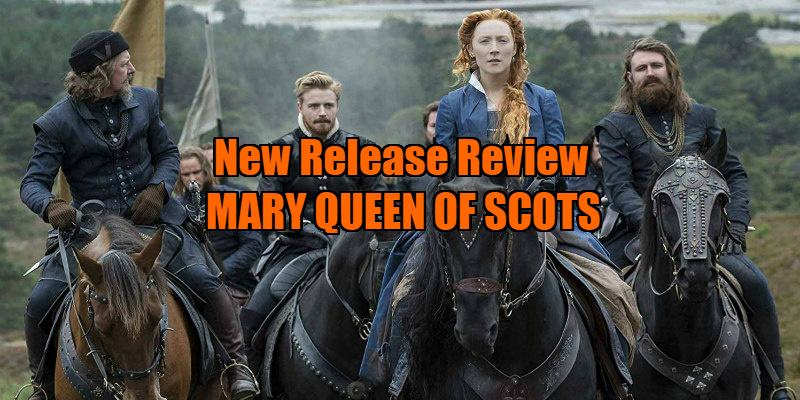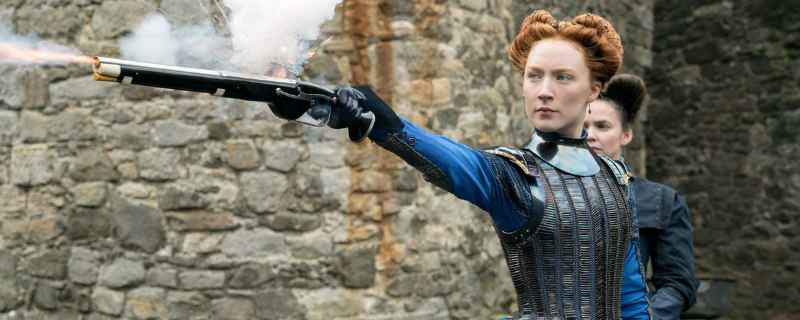
Reimagining of the rivalry between cousins Mary Stuart and Elizabeth I, rulers of Scotland and England.
Review by Eric Hillis
Directed by: Josie Rourke
Starring: Margot Robbie, Gemma Chan, Saoirse Ronan, David Tennant, Guy Pearce, Joe Alwyn, Ian Hart, Jack Lowden

One of the anomalies of European history is how despite centuries of female subjugation, the continent regularly found itself ruled over by women. In the middle of the 16th century, Britain was divided between two female rulers, Mary Stuart, Catholic ruler of Scotland, and Elizabeth I, Protestant monarch of England. As played by Saoirse Ronan and Margot Robbie respectively, Mary Queen of Scots dramatises the rivalry between the two leaders.
The story begins in 1561, when an 18-year-old Mary returns to her birth home of Scotland, having spent her childhood in France, where she become the wife of King Francis II. Upon the French monarch's passing, Mary takes her place on the Scottish throne at Holyrood.

South of the border, Elizabeth and the rulers of England see Mary as a Papist threat to the fresh status of their land as a Protestant nation. Plans are set in motion to marry Mary off to a Protestant to prevent the return of a Catholic to the English throne. Mary, however, proves resistant to such political machinations.
You don't need to be an expert in British history (I'm certainly not) to figure out early on that much of what's presented here by director Josie Rourke and screenwriter Beau Willimon is, well frankly bollocks. They take so much dramatic licence here that you begin to wonder why they didn't just completely reimagine the story in an alternate setting - Mary and Elizabeth as rival girl gang leaders on a council estate, or as leaders of feuding galaxies.

Much of the historical rewriting seems to have been done for the purpose of shoehorning in surface level diversity, none more problematically than the reworking of Mary's courtier David Rizzio (Ismael Cruz Córdova) as an openly gay man who beds her second husband, Lord Danley (Jack Lowden). It's another example of that annoying trope of inserting a gay side character to make a protagonist appear more noble through their acceptance of them, something we saw earlier this year with Lucas Hedges' character in another Ronan vehicle, Lady Bird. It also renders a subsequent major plot development somewhat null, as Rizzio is charged with having an affair with Mary, despite her entire court being all too aware it's Danley he was getting it on with. Elsewhere, black and Asian actors are anachronistically cast in key roles, which while a noble-minded gesture, has the effect of letting history off the hook by portraying a progressive version of an age where rampant bigotry was the norm. We're asked to believe that Catholics and Protestants were at each others' throats, yet monarchs were happy to give prominent positions to minorities and homosexuals.
While it's problematic to whitewash the historical prejudices of the European ruling class in such a manner, the film's best performance undeniably comes from Adrian Lester as Elizabeth's envoy to Scotland, and while his skin colour may not make any historical sense, he's more convincing in his role than either Ronan or Robbie in theirs. The real life Mary would have spoken with a French accent, yet here Ronan struggles with a Scottish brogue, while Robbie's mannered speech gives you the impression her mind is preoccupied with pulling off a believable English accent.

Rourke is a celebrated theatre director, while Willimon is best known as the main writer of TV's House of Cards, and it's all too obvious that Mary Queen of Scots is the product of artists more comfortable in mediums that favour storytelling through dialogue. There's a nice moment where Robbie's Elizabeth, brooding for a child, creates a fake stomach and gazes longingly at the shape of her shadow, but it's an anomaly in a movie that's drowning in dialogue, most of which exists simply to move the plot forward rather than give us any insight into the characters. She's onscreen for most of the running time, but I never felt I got to know who the eponymous Mary was, as the film rarely gives her a break from a stream of politicised exposition.
Rourke makes some confusing visual choices that betray a lack of experience in screen storytelling. A supporting character played by Gemma Chan is constantly presented in close-up reaction shots, appearing to take in everything she's overhearing as though hatching some plot of her own. Presenting her in this way, not to mention casting such a recognisable actress in the role, forces us to assume she will play a major role at some point in the story, yet she remains a background character throughout - it's bizarre. Like so many British historical dramas, anything of visual interest comes not from the cinematography or direction, but from the sumptuous locations, sets and costumes. Mary Queen of Scots is no more cinematic than the average BBC production of its ilk.

Mary Queen of Scots is in UK/ROI cinemas January 18th, 2019.
"With its confounding themes and focus on bodily fluids, Claire Denis' film is 'Adult Sci-Fi' in every sense of the term."— 𝕋𝕙𝕖𝕄𝕠𝕧𝕚𝕖𝕎𝕒𝕗𝕗𝕝𝕖𝕣.𝕔𝕠𝕞 🎬 (@themoviewaffler) May 16, 2019
HIGH LIFE is in UK/ROI cinemas now.
Read @hilliseric's reviewhttps://t.co/zc6MO60wt0 pic.twitter.com/G1nFMTQxnI

